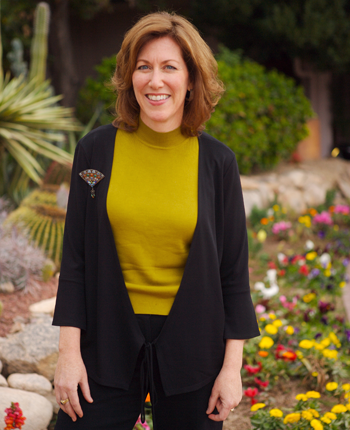
By Patricia Caso/February 28, 2013
About 6.1 million potential moms have difficulty getting or staying pregnant according to womenshealth.gov and the Centers for Disease Control and Prevention–that’s 10% of women in the U. S. ages 15-44! Infertility is such an important and emotional health issue that TWE set out to find some answers about why this is happening in these large numbers and if there is any good news to report on this front.
“There are many, many things couples can do to increase their health, their well-being and in so doing can conceive more easily and have a healthier child.” Dr. Victoria Maizes
Thanks to Dr. Victoria Maizes (@VMaizes), Executive Director of the Arizona Center for Integrative Medicine (@azcim), and her latest book, Be Fruitful, there is some new practical information on maximizing fertility. It’s a great guide as well for those not facing issues but who are thinking about having children.
Dr. Maizes’ positive, engaging passion is contagious. What a delight it was to catch up with her by phone in the midst of her busy schedule to learn more about this life-changing topic…
EYE:What do you want women to know about infertility?
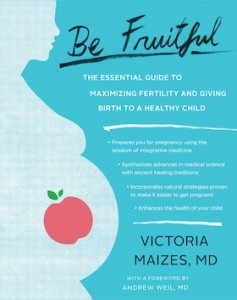 DR. MAIZES: Infertility is defined as a year of trying to conceive without success. That being said, many women conceive after that year by using dietary changes, supplements, mind body practices, traditional Chinese medicine, or assisted reproductive technologies. Integrative medicine thoughtfully combines these approaches and, in many cases, is a successful way to maximize fertility and giving birth to a healthy child.
DR. MAIZES: Infertility is defined as a year of trying to conceive without success. That being said, many women conceive after that year by using dietary changes, supplements, mind body practices, traditional Chinese medicine, or assisted reproductive technologies. Integrative medicine thoughtfully combines these approaches and, in many cases, is a successful way to maximize fertility and giving birth to a healthy child.
EYE: How did you become so passionate about infertility?
DR. MAIZES: I grew up in the shadow of infertility. My grandmother’s sister couldn’t have children; my mother’s younger sister, who lived around the corner from us, couldn’t have children. So here I was this 8,10, and12-year old and I would listen, curiously, to their conversations and hear about my aunt’s surgeries in hushed conversations. Later, as an adult, when I asked her about her inability to get pregnant, she said she was always just too late for the next great miraculous thing.
ln vitro fertilization wasn’t being done for 40-year-olds at that point. Watching her longing to have a child really influenced me. I’ve been a doctor now for 30 years and working at the Arizona Center for Integrative Medicine with Dr. Andrew Weil for 15 years.
Patients’ stories are important and interesting to me in addition to any medical problem that brought them in. I’m really passionate about prevention and health promotion. I don’t think there is any more important time to pay attention to your health than the time you want to conceive.
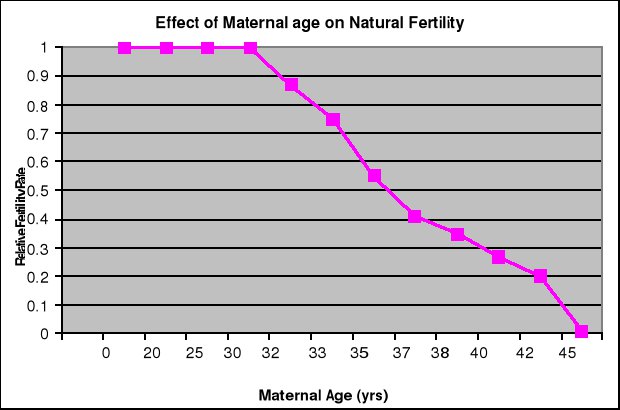
EYE: Why do so many couples have difficulty conceiving?
DR. MAIZES: It has to do with how important age is to fertility. Birth control, as important as it is for women to be in control of reproduction, has increased the average age of women conceiving from 21 (when birth control was introduced in the 60s) to now 25.
Women are also choosing to defer conceiving for a variety of reasons like careers, genetic concerns, finances and later marriages. One of the messages of the book is don’t be fooled that women don’t have a significant biological clock. There is definitely a clock!
EYE: And is that clock for men as well?
DR. MAIZES: Absolutely. For women, the likelihood of getting pregnant peaks at about 28 and then takes a pretty sharp dive at 35. Men, although not tied to the same age range, have to be concerned about environmental influences affecting the sperm. For example, by carrying a cell phone on their belt, men can cut the number of sperm they make as well as make the sperm abnormal. Agewise, men who are over 40 have a greater risk of having a child with autism, low IQ and schizophrenia. Men are fathering children now in their 80’s.
“…there is an erroneous message out there because of all the media attention given to celebrities having babies in their late 40s, even 50s.”
EYE: Going back to women’s average age for conceiving at 25. That doesn’t seem very old?
DR. MAIZES: Twenty-five is an average age. Here are some statistics: a woman in her early 20s has a 1 in 4 chance each month of getting pregnant. By her early 40s, there is a 1 in 20 chance each month. Our age has an enormous effect of the ability to conceive. Additionally, there is an erroneous message out there because of all the media attention given to celebrities having babies in their late 40s, even 50s.
It makes it appear that a woman has all the time in the world to wait to conceive. That’s a problematic message. Many of those women use in vitro fertilization which is very expensive and not necessarily all that effective. (under 35 IVF is 45% effective, mid 40s 7% effective.)
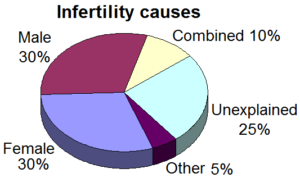
EYE: In addition to age, what are some other inhibiting factors to conceiving?
DR. MAIZES: Let’s start with the fact that the American diet is sad. S.A.D. is the acronym for Standard American Diet. It’s highly refined, processed and with the wrong kinds of carbs, rapidly turning into blood sugar, raising insulin levels and putting you at risk for diabetes, obesity, etc. Additional factors are transfats in the foods, which doctors are starting to address, along with animal protein and stress.
When one is under stress, the brain says survival, and it’s saying it’s time to focus on surviving, not on pregnancy, and shuts down. The hypothalamus signals the pituitary that signals the ovaries and then the testes basically say “cut back, don’t ovulate, this is the wrong time.” Next, many of the environmental chemicals that we are exposed to are endocrine disrupters, which means they alter the way our hormones work and increase the risk of infertility.
I would say there is a synergism of all these factors that reduces fertility. The converse is to clean them up. To maximize fertility, start with eating a healthy diet; take that multivitamin with folic acid; exercise and have practices to quiet and center yourself. Additionally, pay attention to where the environmental chemicals in your life are and remove them to the extent you are able.
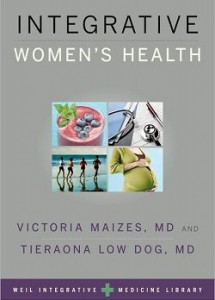 EYE: Would you give us some ideas as to how integrative methods work to enhance fertility?
EYE: Would you give us some ideas as to how integrative methods work to enhance fertility?
DR. MAIZES: Integrative strategy can include traditional Chinese medicine like acupuncture or the Indian traditional medicine, Ayurveda. In practicing medicine, you have a two-fold purpose: to dispel evil and to support the good.
In Western medicine we spend a lot of our focus on dispelling evil, such as antibiotics, antihistamines and antihypertensives, which can be very useful. But we have fewer therapies that support the good.
With infertility, I really like to include traditional Chinese medicine because its underlying principle is to bring greater harmony to the body. For example, some people who come to me wanting to get pregnant are under stress, on-the-go and deficient. Deficient is a concept we don’t have in Western medicine.
The stressed patients are deficient in yin. Yin is the quieting, still quality that is thought to be associated with having a baby. It can support that yin and calm that yang which is that constantly going and doing energy. Yoga and meditation are effective in supporting yin.
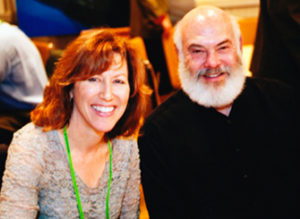
EYE: Are you a proponent of acupuncture?
DR. MAIZES: I am a big fan of using acupuncture when women are struggling or when they are actually at the point when they are using IVF to successfully conceive. I send some of my patients to acupuncture and very often they don’t end up going for IVF. They often describe feeling better, healthier, calmer and an overall preferable quality of life.
Bottom line, when you think of what IVF costs, between $10,000-$15,000 depending on where you live, and you look at what acupuncture costs, somewhere between $50 and $100, it’s well worth considering or integrating.
“There are pros and cons to the choices we make. There are very few cons to living a healthy lifestyle.”
EYE: Who should have in vitro fertilization?
DR. MAIZES: Older women who are using donor eggs are good candidates for IVF. IVF is miraculous. Many people, who have not been able to bear a child, did because of it. I just don’t think we should start there. One of the principles of integrative medicine is to use the most natural and least invasive approach as is appropriate to the situation.
If a woman is 28 or 32, she has time to really say, “Let me try these more natural approaches and let me make my body as healthy as possible.” She doesn’t have to jump to IVF which is costly, has potential side effects and has a higher rate of congenital malformations in the children who are born. There are pros and cons to the choices we make. There are very few cons to living a healthy lifestyle.
EYE: In Be Fruitful, you spend time on self-assessment. How does that become part of the integrative approach?
DR. MAIZES: Another principle of integrative medicine has to do with the fact that the patient and physicians are partners. The patients know how healthy they are, even what works for them more than the doctor. When someone comes to talk with me about planning for pregnancy, I frame it as a wonderful opportunity to self assess, to think about her current lifestyle and what changes she might wish to make.
I also ask couples to think about how having a child will change their life emotionally and spiritually; it’s truly a portal. There’s a saying I heard while in India: “The world is divided into those who have seen the Taj Mahal and those who have not yet seen it.” Likewise there is a way in which having a child defines and changes the rest of your life. It is worth spending some time thinking about readying yourself and the changes you might need to make in your life now.
“I don’t think there is any more important time to pay attention to your health than the time you want to conceive.”

EYE: The internet seems to have made fertility a more open and discussed topic. Terrilox, a blog by 43-year-old Terry Wilcox, chronicles her recent struggle to get pregnant. IVF failed, but she was finally able to conceive through egg donation and practicing yoga to enhance her fertility. You also have your own site. Are women more open now to talk about the topic and their personal experience?
DR. MAIZES: There is absolutely more awareness. The intenet has taken away the isolation and secretiveness of fertility issues. Women, often mommy bloggers, are sharing information and resources.
EYE: What do you want a couple to take away from your book?
DR. MAIZES: I want the reader to have the hopeful message that they actually can make a difference. Be Fruitful targets the younger group with fertility issues, but the tips are good for any age looking to become pregnant! The actions couples take to eat a healthier diet, reduce their stress, to pay attention to environmental chemicals and to take appropriate multivitamins are critically important.
There are many things they can do to increase their health, their well-being and, in so doing, can conceive more easily and have a healthier child. I also want us as a society, not just individuals, to think about the childcare policies we have.
Europe and Canada guarantee a woman’s job for a year after childbirth. They make it easier for people to have a family. I wish this country could pay more attention to these kinds of issues. I would love this book to be a platform to lead to some societal change.
EYE: Many struggling couples can be heartened by Be Fruitful. I would like to add that I think many of your guidelines go beyond helping those who are dealing with pregnancy. There is terrific advice for anyone who wants to maximize a healthy quality of life! Thank you, Dr. Maizes!
TWITTER: @VMaizes
###


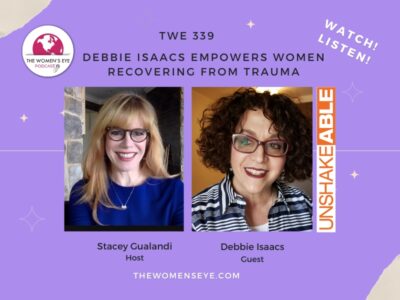
Leave a Reply